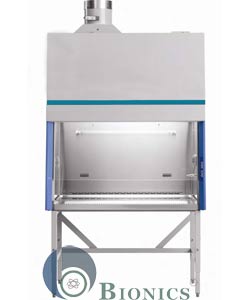How Much is it Worth For microbiological safety cabinet
How Much is it Worth For microbiological safety cabinet
Blog Article
Class 2 Biosafety Cabinets – Vital for Lab Safety and Biological Containment

Maintaining a safe lab environment is crucial in today’s advanced research and clinical setups. Whether it's conducting biological tests, diagnostics, or experiments with infectious agents, biosafety cabinets play an integral role in contamination prevention and sample integrity.
Among the available options, Class 2 Biosafety Cabinets stand out for their balanced protection. These units are essential for labs working with infectious materials or clinical diagnostics.
Understanding Biosafety Cabinets
Biosafety cabinets are specially designed, enclosed systems that ventilate and filter lab air. They use advanced filters to trap harmful particles before air re-enters the lab.
These units are generally classified into three categories—Class I, Class II, and Class III. Among these, Class 2 cabinets are the most versatile and commonly used.
What Are Class 2 Biosafety Cabinets?
Class 2 Biosafety Cabinets are designed to safeguard three aspects: the operator, the sample, and the environment. They utilise downward laminar airflow within a sealed system.
Contaminated air is drawn into the cabinet and filtered through HEPA systems before recirculation or exhaust. These cabinets are ideal for work involving moderate-risk pathogens (BSL-2/3).
Essential Features of Class 2 Safety Cabinets
A Class 2 microbiological safety cabinet includes several integrated safety mechanisms such as:
• HEPA/ULPA filtration to trap microbes and particles
• Uniform downward airflow to protect the sample zone
• Negative pressure barriers to prevent leakage
• Germicidal UV lamps to disinfect the work area
• Low sound emissions to reduce fatigue
• Transparent sash or viewing window for easy access and monitoring
These elements create a clean, contained, and user-friendly workspace.
Where Class 2 Cabinets Are Used
Class 2 Biosafety Cabinets microbiological safety cabinet are commonly used across microbiology, biotechnology, diagnostics, and pharma. They are ideal for safe handling of samples during testing and experimentation.
Hospitals, research labs, and manufacturing units depend on these cabinets for contamination control.
Why Laboratories Prefer Class II Safety Cabinets
Using Class 2 cabinets offers multiple advantages including operator protection and experimental reliability:
• Reduces the risk of sample cross-contamination and error
• Acts as a barrier between user and biohazard
• Improves environmental safety by filtering outgoing air
These cabinets help labs meet safety regulations while maintaining workflow.
Cabinet Types and Global Compliance
Top manufacturers build Class 2 cabinets in accordance with strict international guidelines. Class 2 units are sub-classified as A1, A2, B1, and B2—based on varying airflow balance and ducting needs.
• Type A2: Most commonly used cabinet model
• Type B2: Suited for labs dealing with toxic agents
Choosing the correct subtype is vital for achieving optimal safety and functionality.
Choosing the Right Biosafety Cabinet
Before purchasing, consider:
• Your application type (e.g., diagnostics, pharma, research)
• Cabinet dimensions, ducting needs, and room layout
• Ease of use, energy efficiency, and upkeep
• Warranty, training, and certification services
Partnering with a trusted provider helps meet both performance and safety needs.
Installation and Safety Guidelines
For optimal results:
• Minimise airflow interference during operation
• Get periodic validation from certified technicians
• Ensure operators follow best practices
Operational best practices include:
• Use gloves, gowns, and face shields while operating
• Minimise hand movements inside the cabinet
• Decontaminate surfaces before and after use
• Never activate UV when humans are present
Final Thoughts on Class 2 Biosafety Cabinets
Class 2 biosafety cabinets are a cornerstone of any safe, efficient laboratory. They ensure contamination-free experiments and personnel safety.
From clinical research to vaccine development, Class II cabinets maintain sterility in sensitive procedures. When investing in a biosafety cabinet, choose performance and reliability over cost-cutting—because safe science starts with smart containment. Report this page